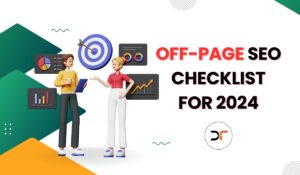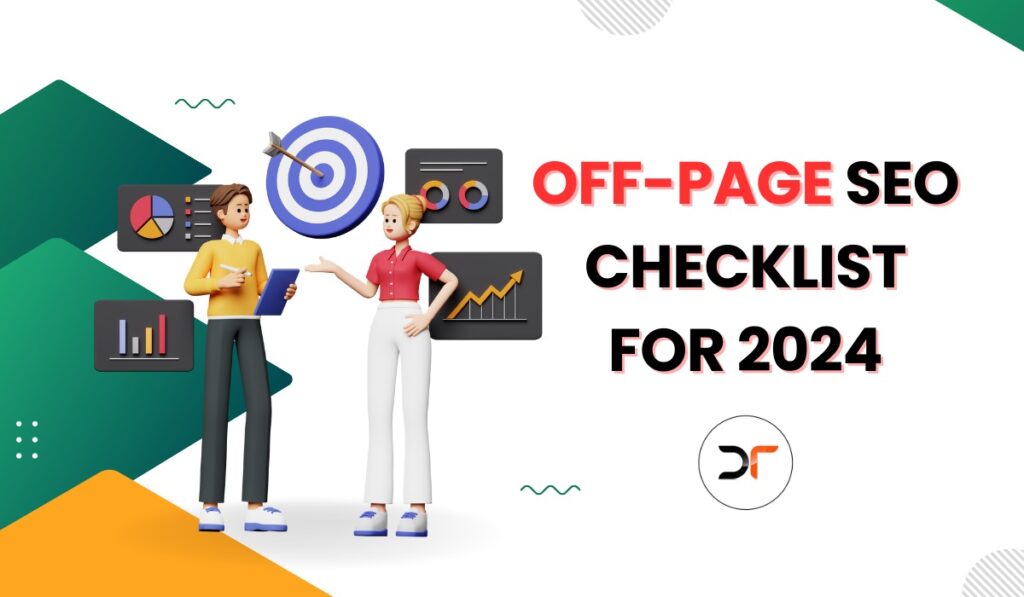Introduction
Maintaining a competitive edge in the always-changing world of search engine optimization (SEO) requires keeping up with the most recent techniques. Off page SEO is crucial for building your website’s authority, trustworthiness, and exposure online, while on page SEO makes the groundwork for a well-optimized website. In this comprehensive tutorial, we’ll go into the crucial off page SEO checklist you need to know in 2023, emphasizing the phrase “Off Page SEO Checklist.”it is a old school yet helpful for devising a comprehensive strategy.
The importance of Off Page SEO
Off-page SEO is an insight into activities that take place off your website’s pages yet significantly impact its online reputation and search engine rankings. It all comes down to creating a credible web presence that search engines will recognize and value. Off-page SEO tactics that are adequately implemented can boost organic traffic, improve search engine ranks, and raise brand awareness. Let’s get started with the 2023 Off-Page SEO Checklist.
Quality Backlinks
Building high-quality backlinks is one of the pillars of off-page SEO. Find reputable and pertinent websites in your field, then produce good material to generate natural backlinks. Avoid spamming techniques that could penalize you by search engines, such as buying links.
Start by conducting an in-depth study to find authoritative websites in your field. Send them well-written mails and emphasize the value your material may provide to their audience. Work with other webmasters and bloggers to achieve a variety of backlinks from different domains. Search engines interpret backlinks from reliable websites as “votes of confidence” in your material, indicating to them the authority and relevance of your website.
Contributed content and guest posts
Guest posting is still a powerful off-page SEO tactic. Find respectable websites that welcome guest posts and produce well-researched, unique, and educational content. To increase traffic and your site’s authority, include pertinent connections to your website in the guest post.
Give websites that closely fit your niche priority when pursuing guest writing possibilities. To properly design your contributions, research their audience characteristics, content style, and submission requirements. Create engaging and helpful content that not only highlights your knowledge but also appeals to the visitors of the host website.
Include your goal keywords in your guest articles’ body and anchor text naturally. This aids search engines in determining the value of your backlinks to the information on your website. To further establish your authority and promote a feeling of community, connect thoughtfully with readers in the comments section of your guest pieces.
Social Media Engagement: Creating Connections
Social media interaction is a crucial off-page SEO strategy in today’s connected society. Engage with your audience, distribute your work, and keep an active presence on popular sites. Social sharing increases traffic and informs search engines about the relevance of your material.
Sharing links on social media is only one aspect of effective participation. Create engaging social media postings that promote participation, sharing, and conversations. Use pertinent hashtags to increase the reach of your material and the number of people who can find it.
Engage with your fans and reply to messages and comments right away. Gaining a devoted social media audience can boost your visibility as your material is circulated and discussed in various venues.
Influencer Outreach: Partnership for Impact
Utilize/use influencer outreach to strengthen your off-page SEO initiatives. Working with influencers in your industry can help your material reach a larger audience, increasing visibility and generating possible backlinks.
Establish meaningful relationships with influential people in your field by identifying them. Look for ways to add value for the influencer rather than concentrating simply on the advantages you stand to get from the collaboration. This can entail collaborating on content creation, holding joint webinars, or cross-promoting one another’s projects.
Influencers can help you access their engaged audience and significantly increase the reach of your content. Influencers that find your content worthwhile may share it with their followers, which may increase website traffic, brand mentions, and potentially beneficial backlinks.
Expanding Your Reach with Content Syndication
Republishing your top-notch material on reputable platforms with the appropriate canonical tags is known as content syndication. Your audience might grow, and you can get valuable backlinks by syndicating your material to respected platforms.
When considering content syndication, pick websites that are well-known in your sector. Check to see if they use the proper canonical tags so that search engines can identify the content’s source.
Create attention-grabbing headlines and introductions for your syndicated material to attract new readers. To increase traffic and maintain control over the SEO value of your material, clearly cite the source and link back to the original piece on your website.
Engagement with the Community
You can present your knowledge by participating in online forums, communities, and Q&A websites. Answer questions thoughtfully, interact with users, and, when necessary, include pertinent connections to your website.
Find active online communities and forums relevant to your niche and where your target market congregates. Participate in debates and offer insightful contributions highlighting your knowledge and problem-solving abilities.
When adding links to forum postings, be sure they are pertinent, improve user understanding, or offer further resources. Avoid using too much promotional language or making comments that are only meant to benefit you because these can damage your reputation in the community.
Local SEO and business listings: Taking Control of Local Searches
Local SEO is vital for companies with physical locations. Your Google My Business listing and other local directories should be optimized. Customer evaluations should be encouraged because they affect local search results.
Ensure all the information, such as your company name, and contact detail is accurate, true and consistent before claiming and verifying your Google My Business listing. Choose categories that appropriately reflect the products and services offered by your company.
Request evaluations from pleased clients on your Google My Business profile. Positive and bad reviews should be addressed quickly to show dedication to client pleasure.
Promotion of Content
For off page SEO to be successful, a well-executed content promotion strategy is necessary. To broaden the audience for your material, use email marketing campaigns, social media advertisements, and other paid channels.
Create email campaigns that are appealing and that emphasize the importance and value of your material to your subscribers. Segment your email list to ensure the proper audience sees the suitable material.
Utilize social media advertising to focus on a specific niche and widen the audience for your content. Please make use of the platform’s targeting capabilities to make sure that users who are likely to interact with your content see it.
Investigate collaborations with relevant websites and industry influencers to promote each other’s material. The exposure and reach of your material can be considerably increased through collaborative content promotion.
Using Video and Multimedia to Engage Audiences
Your off page SEO approach should include video material. Make interesting videos and post them on websites like YouTube. Use relevant keywords to improve your videos’ titles, tags, and descriptions.
With billions of active viewers on platforms like YouTube, video material has become increasingly popular. Make educational and exciting movies that answer frequently asked topics, offer tutorials, or advertise your goods or services.
Optimize the video metadata, including the titles, descriptions, and tags, before submitting your films to websites like YouTube. Include pertinent keywords to make your movies more visible and improve their SEO worth.
Respond to viewers’ comments and promote dialogue to engage them. Your brand’s visibility and authority may rise as your video receives more views, likes, and engagements.
Monitoring and Analysis
Check your backlink profile frequently for any spammy or low-quality links. Track the effects of your off page SEO initiatives on traffic and rankings using tools like Google Analytics and Search Console. To achieve the best results, modify your plan as necessary.
Regularly examine your backlink profile using Ahrefs, Moz, or SEMrush tools. Take appropriate action, such as disavowing or asking removal of any backlinks that could be damaging or of low quality.
Google Search Console and Google Analytics offer helpful insights into your off page SEO initiatives’ performance. To evaluate the success of your tactics, keep an eye on essential indicators like organic traffic, click-through rates, and keyword rankings.
Review your content’s performance on social networking sites and other advertising channels on a regular basis. To hone your content promotion strategy and concentrate on approaches that deliver the best results, identify trends and patterns.
Conclusion
Off page SEO is a dynamic field that necessitates flexibility and an all-encompassing strategy. You may improve your website’s authority, visibility, and search engine rankings by putting the tactics described in this Off Page SEO Checklist into practice. Remember that a successful SEO campaign is built on a good off-page SEO strategy and efficient on-page optimization methods like those offered by Rank Math. Keep informed, be proactive, and observe how your website performs online.










